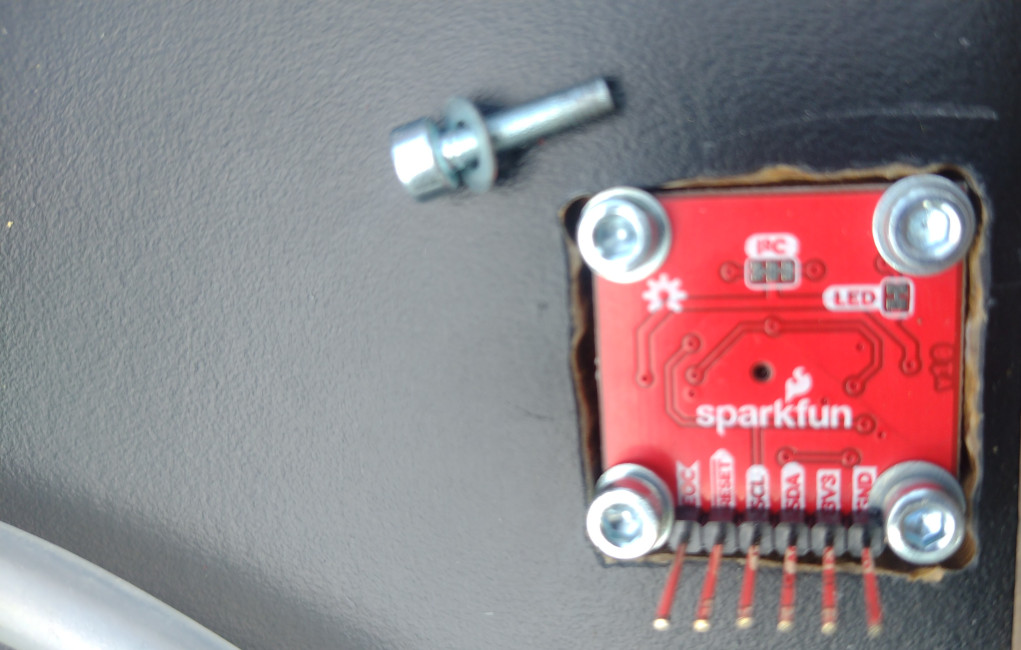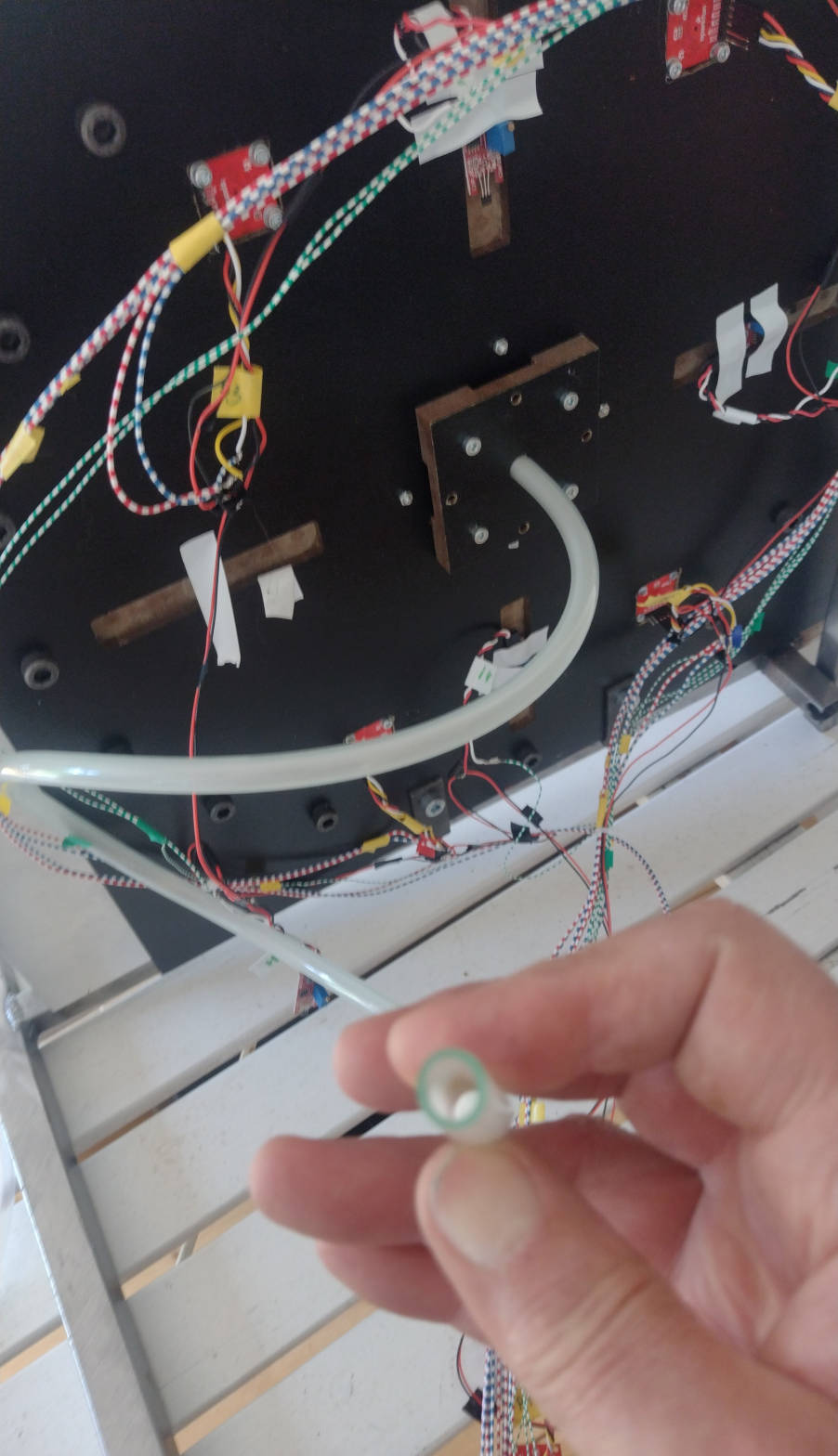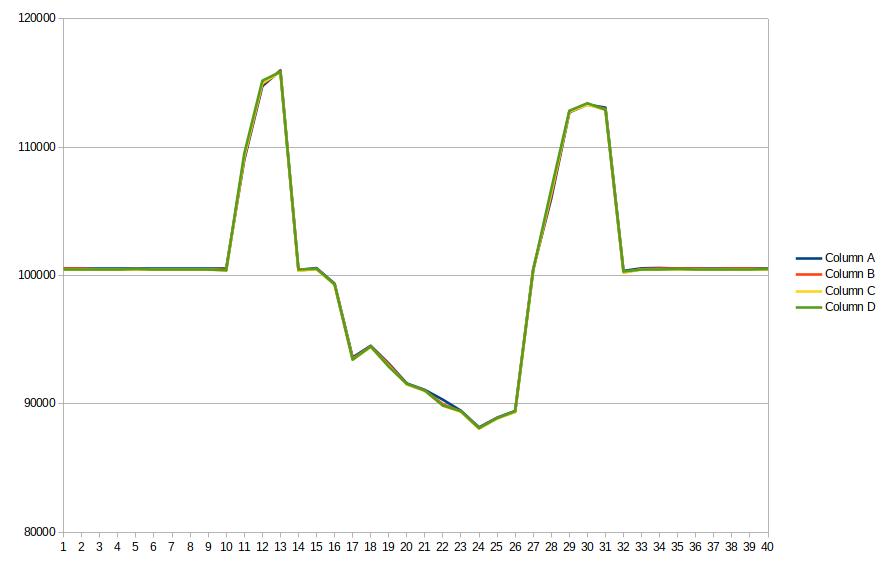
















Li.U Lab Model 3 Pressure Test
Succesful Pressure Test Of The Updated Lab Model V3 From The Three
Joint GREC Sustainable Groups Project at Linköping University
Background
As flagged by the Linköping University Workshop the GREC Lab Model V3
was not fully assembled in time for final the project presentation. The three
groups did a brave assembly after their presentation but before finishing
their term. Unfortunately time was running out again and they did not
achieve any results in their brief testings.
After the term nilsinside AB was allowed to borrow the Linköping Lab Model
during the summer season for debugging and updating in Varamon, Motala.
 One of the four pressure sensors tested in the first GREC Lab Model V3 test at nilsinside AB
One of the four pressure sensors tested in the first GREC Lab Model V3 test at nilsinside AB
At nilsinside the the symptoms were analysed and systematic iterative work
was done to adjust and seal the GREC LabModel v3 during June and beginning
of July 2023. For every assembly it got a little bit better and the first
acceptable pressure test (this one) was conducted the 11th of July 2023 using
lungs and a plastic tubing.
 The Green Revolution Energy Converter (GREC) Lab Model V3 with
temporary plastic tubing. You may also locate the four pressure sensors.
The Green Revolution Energy Converter (GREC) Lab Model V3 with
temporary plastic tubing. You may also locate the four pressure sensors.
In this first short test the LabModel v3 was operated by the Mechatronics group
software "Kombinerad_kod.ino".
With a WGV revolution at 2 Hz (120 RPM) the software recorded the 4 pressure
sensors simultaneously in their 4 different
locations (Columns) WITHOUT any temperature difference between both of the heat
conducting sides. The four graphs follow each other so well that they almost
completely overlap. The Lab Model v3 finally appears to be without disturbing
friction and also fairly tight.
 The Green Revolution Energy Converter (GREC) Lab Model V3 pressure/time test diagram with overlapping graphs
The Green Revolution Energy Converter (GREC) Lab Model V3 pressure/time test diagram with overlapping graphs
Ambient temperature: 19°C (292°K)
Temperature Gradient, ΔT = 0°C
Ambient pressure: 100 564 Pa
Maximum pressure in this test, P max: 115 977 Pa
Minimum pressure in this test, P min: 88 170 Pa
Pressure difference in this test, ΔP = 27 807 Pa (corresponds to an approximately
80°C heat gradient.)
Observations:
• Ambient pressure from time line 1 to 10
• Pressurization from 10 to 13 (by blowing)
• Relieving pressure 13 to 14
• Suppression from 15 to 17 and then blocking the tube
• More suppression from 18 to 24 and then blocking the tube again
• Relieving suppression from 26 to 27
• Pressurization from 27 to 30 and again blocking the tube
• Finaly relieving the pressure to ambient from 31 to 32
• Note: At the positions between 17 to 18 and from 24 to 26 and from 30 to 31 the
tube is completely closed so the linear coefficient shows a small leakage in
the GREC system boundary.
Hopefully the leak disappears when we tightly cover the R-S shaft passage areas.
• Note: The four different pressure graphs are momentarily separated in positions
between 12 - 13, and between 21 and 23 indicating a small variation between
the individual pressure sensor values. This may rather indicate a variation
in response time (which in turn may depend on sampling time in the I2C bus,
software, processor frequency, sensors etc.) than in a real pressure difference.
Next follow up will be a few tests with minor temperature gradients to confirm
if the graphs still overlaps. It might be that they separate proportional
to the revolving speed.
The Technology
In thermodynamic terms the GREC is a closed system with a moving boundary
where the GREC converts heat energy to kinetic energy. The GREC heats up
and cools down its internal large sliced WGV efficiently, fast and repetitively,
resulting in internal pressure changes.
These internal pressure changes are used by its moving boundary to generate
kinetic energy. You may think of the GREC as a revolving Carnot heat engine
controlled by computer logic. Please find the theoretical presentation of
the GREC on this link:
GREC Theory Presentation
The GREC is a new technological solution to tackle climate change. Spring 2023
there were three groups at Linköping University that thrived on the challenge
of a transition to fossil free energy systems. They constructed and built
the Lab Model v.3 as a step in the GREC climate positive project. Still leaking,
but this test turned out to be a significant proof of the GREC internal pressure
distribution. A real and repeatable physical proof. This Linköping University
Lab Model v3 is now ready for continuing research projects.
Please feel free to call or email:
Contact information at nilsinside AB
Nils Karlberg nils@nilsinside.com, tel +33 608 53 15 93, theory & technical questions
Sophia Karlberg sophia@nilsinside.com , strategy & admin questions
The GREC Project




































